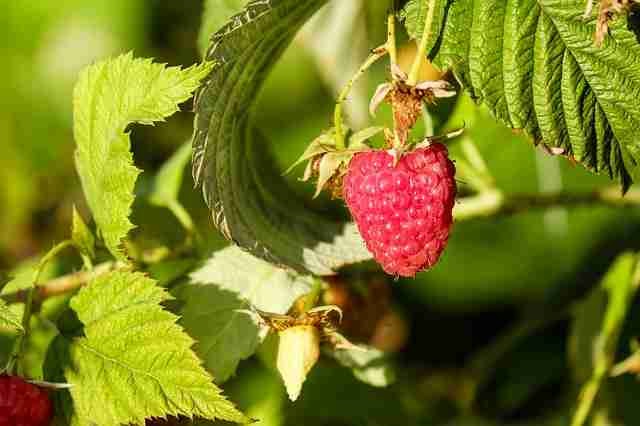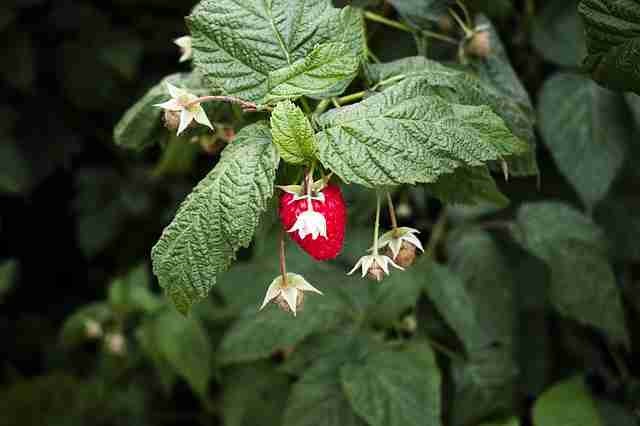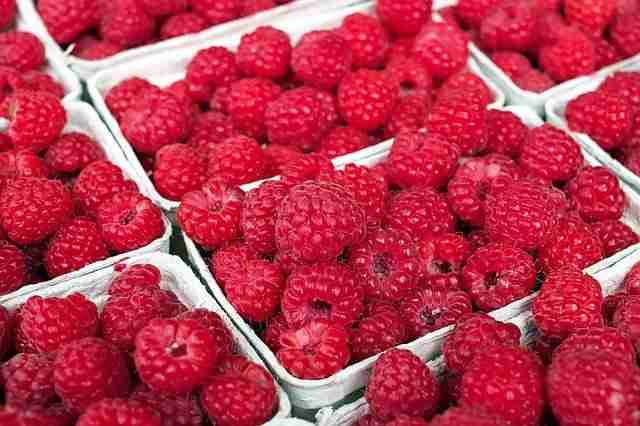Often we buy fresh or frozen raspberries whilst many grow raspberry bushes, however, sometimes we have too many and it’s good to know if our chickens can eat raspberries?
The good news is yes, chickens can eat raspberries and also raspberry leaves from the bush/plant and they’re extremely healthy for them and safe for chickens to eat…

Are Raspberries Healthy for Chickens?
Raspberries and raspberry leaves are safe for chickens to eat but they are also incredibly healthy for chickens to include in their diet too. Include as part of a balanced diet though…

Raspberries are high in water and their juiciness proves that, however, unlike some fruits that are high in water, raspberries are also packed full of nutritional benefits for chickens too.
Nutritional Content of Raspberries
| Typical Values | Per 100g |
| Total Fat | 0.7g |
| of which saturated | 0.0g |
| Carbohydrate | 12g |
| of which sugars | 4.4g |
| Fiber | 7.0g |
| Protein | 1.2g |
| Salt | 1.0mg |
| Vitamins and Minerals | |
| Vitamin B6 | |
| Vitamin C | |
| Calcium | |
| Magnesium | |
| Potassium | |
| Iron |
Fat
Fat levels are that low in raspberries (below 1%) that the levels of fat can be pretty much ignored when considering feeding raspberries to your chickens. Still feed in moderation though.
Carbs
Carbohydrates for chickens are not considered to be the main part of their diet and are normally kept minimal due to their nutritional value. However, raspberries have dietary fiber.
In fruit, carbs are normally made up of natural sugar but raspberries are full of dietary fiber and therefore they benefit chickens by helping with bowel and digestion health.
Protein
Raspberries contain more protein than lots of other berries and protein contributes towards healthy muscles and tissue repair in chickens.
Salt
Salt is present in raspberries but in low enough quantities so as to not have to worry about it (1.0mg).
Vitamin B6
Vitamin B6 is important for several functions in chickens and helps with anemia, reduces skin issues, regulates mood and stress, as well as maintaining their immune system.
Vitamin C
Vitamin C is important for the immune system of chickens but can be particularly helpful to chickens during respiratory illness outbreaks. Too much Vit C can cause diarrhea.
According to this article, one chicken owner experienced respiratory issues and she broke up a few 1000mg vitamin C tablets and mixed 1 per bird (7) into their food and saw good results.
Please note, I am not endorsing this method, I just wanted to share what a chicken owner did and the results they got. I cannot verify the results so please use caution if replicating this.
Calcium
Calcium is important and especially so for a chicken. Calcium helps to ensure chickens have strong and healthy bones but there must be enough to ensure a hard shell too.
Magnesium
Magnesium is added to poultry feed to help with bone development and cell metabolism. Homegrown raspberries are a better, more natural way of adding magnesium than artificially.
Potassium
Excessive potassium is harmful to chickens like any other foods if they’re overfed with them but the levels of potassium in raspberries is nothing to worry about.
Iron
Iron should not be included via vitamin tablets but foods that are low in iron are fine for your birds to eat. Large levels of iron are toxic but raspberries are at a safe level.
How to Feed Raspberries to Chickens?
It’s always best to buy organic raspberries from a store/shop or to grow pesticide-free raspberries from your own garden if you want the most nutritious types for your chickens.
You can buy organic frozen raspberries which makes it easier to regulate portion size because you can just take out the raspberries you need and put the rest back in the freezer.

If you’re feeding raspberries to chickens for the first time then it may be best to cut them in half just to get them used to the soft flesh inside and not put of by the slightly firmer outer.
I honestly don’t think you’ll have to slide the raspberries as most chickens will go wild the minute you place them inside the run or food dish.
If your raspberries are bought in a store/shop and not classed as ‘organic’, then personally, I would either wait till you buy some organic ones or give them a good rinse in cold water first.
If you have a raspberry patch and you don’t mind it being ransacked then go for it. They’ll polish off all the raspberries and peck at the leaves which are also safe too.
Do not use any harmful pesticides on your own crop of raspberries as they’ll make your chicken very sick and even death.